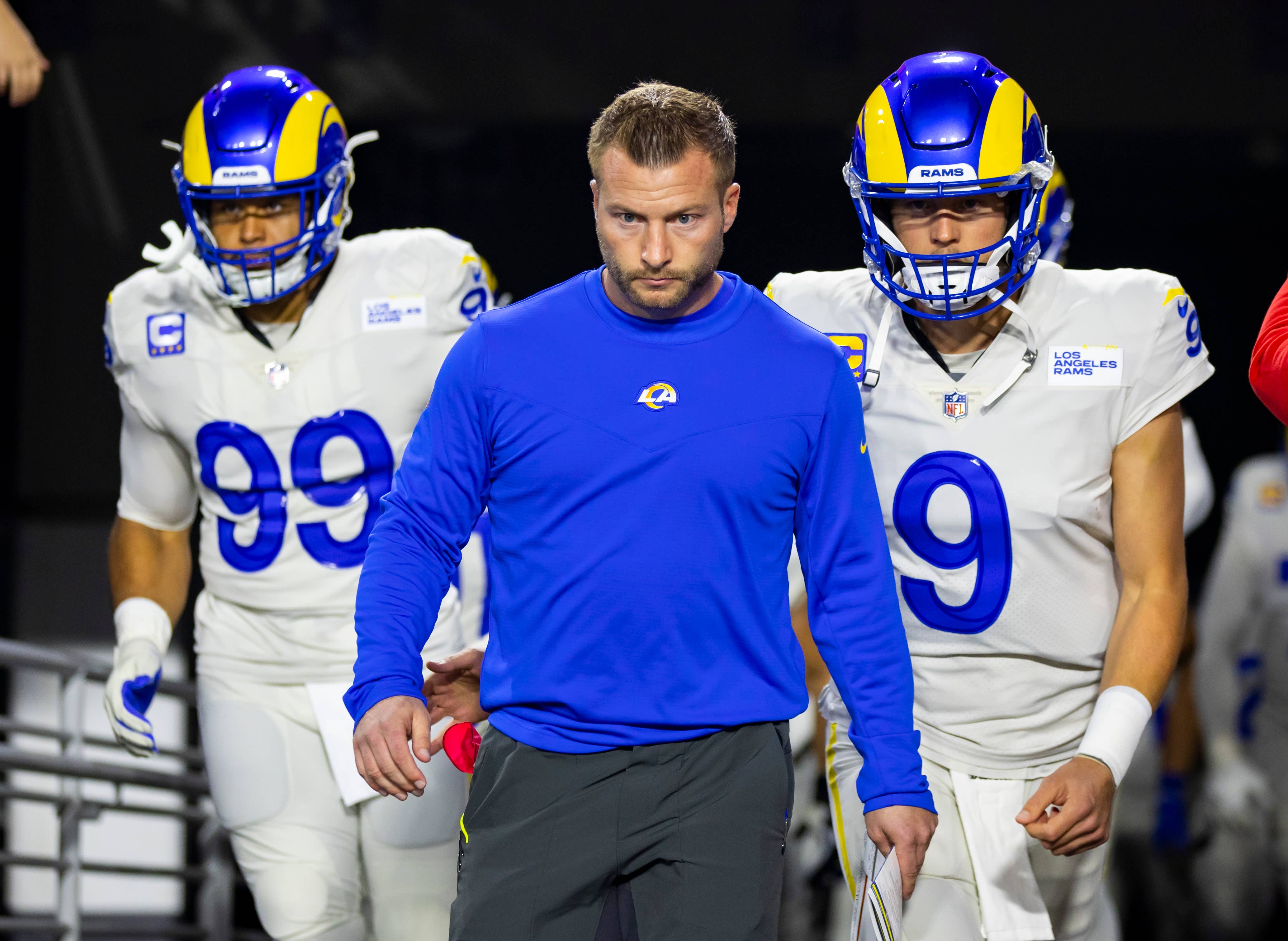
Super Bowl LVI features two franchises that took dramatically different approaches to reach the pinnacle. The Rams aggressively manipulated the salary cap and available assets in order to supercharge their roster over the last three seasons. The Bengals augmented their team through free agency, but largely built their foundation in the draft.
The star-heavy, asset-barren approach by Rams general manager Les Snead has made him a unicorn in today’s asset-hoarding NFL. Teams are willing to trade impactful veterans for late-round picks without blinking, and often trade down for mediocre mid-round picks instead of capitalizing on more valuable draft slots. The Rams have chosen to rely on stars who can elevate their peers over gambling on unproven younger talent.
The Rams’ idea is brilliant in principle. Maximize the possibility of winning big by acquiring high-earning but impactful pieces. However, throughout the last three decades of NFL transactions, few teams have successfully gone all in on a super team.
The Jaguars, Jets, Commanders, Dolphins, and Eagles all famously ventured into free agency over the last 20 years. Each team splurged on top free agent names without regard for the potential downsides of missing on aging talent. The goal was to assemble a roster reliant on top-end names who could perform at an elite level when adversity reached its apex.
Few teams that have taken the same level of investment as the Rams have seen even as much success as they have to this point. The ’90s Cowboys will forever be the gold standard after they maximized their ability to use free agency en route to three Super Bowls.
Since then, the only other super teams to win a Super Bowl that were more reliant on star acquisitions from free agency were the 2015 Broncos and 2020 Buccaneers. Both teams inked Hall of Fame quarterbacks (Peyton Manning and Tom Brady), in addition to key defensive starters that were Pro Bowl talents. Every other champion since the Cowboys opted to not trade draft picks and heavily spend cap space on unrestricted free agents.
The Broncos acquired DeMarcus Ware, Aqib Talib, T.J. Ward, Emmanuel Sanders, and Vernon Davis in addition to Manning. The Buccaneers acquired Shaquil Barrett, Ndamukong Suh, Leonard Fournette, Antonio Brown, and Rob Gronkowski, in addition to Brady. Like most of the Rams’ moves, these stars were signed or acquired over a two-year window. Both franchises quickly changed.
The Rams had their own similar approach in 2018 when they lost to the Patriots. They had traded for Marcus Peters, Brandin Cooks, Talib, and Suh. It’s impressive they quickly flipped those acquisitions to remake their roster with Stafford, Jalen Ramsey, Von Miller, and Odell Beckham. Although Stafford doesn’t have the cache of Manning or Brady, a Super Bowl win against Cincinnati would likely all but solidify his Hall of Fame destiny.

Stafford is on pace to finish in the top 5 of all-time passing yards and touchdowns if he can continue at a reasonable pace of production for the next five seasons. He’ll be much more statistically impressive than Ben Roethlisberger, Eli Manning, and Philip Rivers, despite playing for the lowly Lions for much of his career. The Rams’ decision to trade two first-round picks and Jared Goff may end up being one of the most career-changing transactions of all-time based on how a Super Bowl win would validate Stafford’s legacy.
The trade for Stafford will always be the boldest since McVay was hired in 2017. Their deep list of trades since 2017 has a consistent trend of utilizing late-round picks to acquire immediate help at impactful positions. Whether it was Marcus Peters, Dante Fowler, or Brandin Cooks, the Rams were trying to blend a strategy of maximizing the impact of a veteran without sacrificing all future assets.
That began to change in 2019 when Jalen Ramsey was acquired for two first-round picks. Ramsey’s arrival put immediate cap constraints on the Rams since they lost the ability to replenish the roster with those two premium picks. Everything prior to 2021 felt aggressive, but this last year has been unprecedented in NFL history.
In 2021, the Rams traded a 2021 third-round pick, their 2022 first, second, third, and sixth-round picks, and 2023 first-round and fourth-round picks for the haul of Stafford, Miller, and Sony Michel. They took full advantage of rare opportunities to acquire an impactful quarterback and pass rusher in trades, compared to past failed all-in efforts that misidentified good investments, such as Washington trading for Donovan McNabb and Philadelphia signing Nnamdi Asomugha.
Trying to replicate what the Rams have built will always be difficult due to cap restrictions and the risk involved with such a strategy. Coaches and front office members can quickly go from hero to goat if they make the wrong deals. It’s hard to envision another franchise having the same level of opportunity to build a super team in a similar fashion based on current rosters and trade opportunities.
Regardless of whether the Rams beat the Bengals or not, their all-in strategy worked in 2021. They’re a favorite to win the Super Bowl and have stars littered throughout their roster. This is a team set for continued contention over the next few seasons because of their top-end talent.

